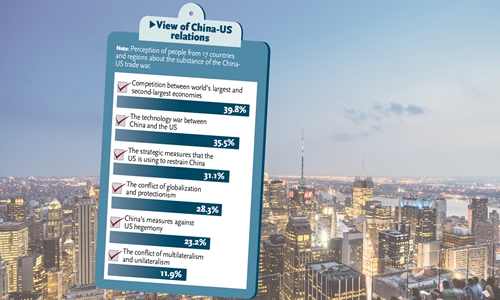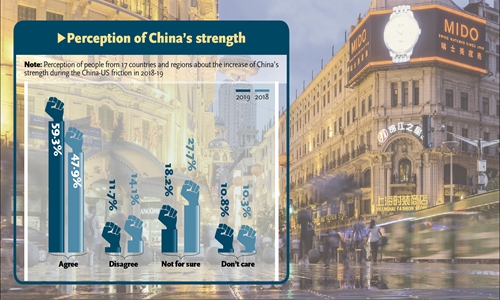HOME >> SOURCE
Trade war makes China stronger
By Xie Jun Source:Global Times Published: 2019/12/22 21:58:39
Pushes nation to strengthen independent innovation, pursue structural transition

Graphic: GT
China is emerging stronger after the 18-month-long China-US trade war, according to a survey conducted by the Global Times recently. It also showed that the trade friction that the US launched against other countries, plus other US bulling moves, is eroding the US government's global influence.Experts agreed with the results of the survey in that the China-US trade war has speeded up China's trade structural transition. It has also pushed China to strengthen independent innovation, which enhances the overall strength of the Chinese economy.
The poll was taken by the Global Times' Global Poll Center. It covered residents aged above 18 in 17 countries and regions, including China itself, the US, UK, France and Egypt. The poll collected responses to 17,496 questionnaires, and there were roughly 1,000 respondents from each country or regions.
The poll was conducted at a time when the world's two largest economies are locked in a prolonged trade war. The dispute has cast shadows on the global trade prospects, while the world is watching closely as to how the trade war would evolve.
However, more and more people seem to share the view that the trade war is making China stronger instead of weaker. According to the results of the poll, almost 60 percent of the respondents believe that China's strength has "increased dramatically" during the China-US competition, up from 47.9 percent in the survey last year.
Li Chunding, head of the Economics and Trade Department of the College of Economics and Management at China Agricultural University, said that the trade war has cost China a little bit of GDP growth, but it has speeded up China's economic structural transition, which is beneficial to the country's economy in the long term.
"In order to cope with the impact of the trade war, China has made many positive changes to its trade structure, such as multiplying trade partners and shifting from processing trade to general trade with higher added value. Those changes in turn are improving China's economic quality," he told the Global Times on Sunday.
In the first 11 months this year, China's trade with economies along the Belt and Road Initiative belts rose 9.9 percent on a yearly basis to 8.35 trillion yuan ($1.19 trillion), customs data showed.
Cong Yi, a professor at Tianjin University of Finance and Economics, argued that the trade friction is pushing China to develop key technologies on its own via innovation as well as taking action to expand the domestic market.
"China has never experienced a large-scale trade war in the past, but it is something that China must face up to with its economic rise, and so far China is adapting quite well. It didn't cause serious problems for the Chinese economys," Cong told the Global Times on Sunday.

Graphic: GT
World stands with ChinaAs the trade war proceeds, China is winning more support from its partnerss with its opening-up policies, while the US' global influence is waning as many people are upset about US hegemony and protectionism, the survey showed.
The majority of the respondents, or 62 percent, thought that the China-US trade war had exerted a negative impact on the world, while only about 10 percent held the opposite view.
More than 55 percent of the respondents agreed that the US global image has been eroded in recent years, citing reasons like trade friction and the "America First" diplomatic policy, while nearly 13 percent thought the country's image hadn't changed. In comparison, more than 55 percent thought China's global image has improved and 63.8 percent thought China is exerting a larger influence on the world.
"Peaceful development is the world's mainstream demand, as there are still many countries that have not completed industrialization and don't want the world to go back to protectionism ands isolation. As long as China practically pushes opening-up, the world will stand on the side of China," Cong said.

Graphic: GT
Trade war future uncertainResults of the poll also showed that an uncertain or downbeat mood prevailed as to the prospects of the China-US trade friction, despite signs of progress in the two countries' trade negotiations.
Among Chinese respondents, 42 percent thought that the trade war may intensify, while 40 percent said they were not certain. More than 60 percent of the US respondents either thought the trade war would deteriorate or expressed uncertainty about its future.
In mid-December, the two countries agreed on the content of a phase one trade deal, which is widely deemed to be a majosr breakthrough.
Li expressed a cautious outlook for the two countries' trade prospects, saying that later stages of negotiations will be more difficult and the trade war might worsen again with the US resuming the tariffs it has promised to cut.
"I think the trade war is more about the US launching strategic squeezes on China to prevent the latter's economic rise. In this sense, the China-US economic dispute won't stop, even with the signing of the phase one agreement, and the US might try to contains China in areas other than trade, such as investment and finance," he said.
RELATED ARTICLES:
Posted in: ECONOMY